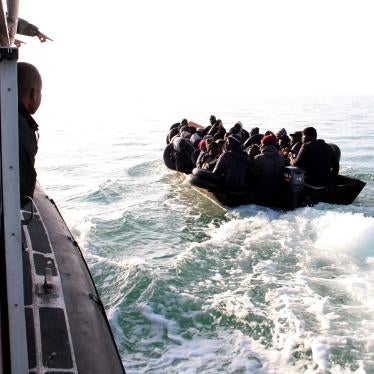Five years ago this month, French authorities dismantled the sprawling Calais migrant encampment known as the “Jungle,” dispersing hundreds of men, women, and children to refugee centers across the country. But because the draw of northern France is its proximity to the United Kingdom, migrants returned to the region almost immediately.
Abdul Saboor, a 29-year-old photographer who spends much of his time in Calais, has documented everyday life in the encampments there and in nearby Grande-Synthe, where people have faced mass evictions and other regular police harassment.
He met with me in Paris, where he lives, to show me his work. He pulled up some images he’d taken in February, when snow blanketed the ground and covered the tents and tarps people used for shelter. “One day we were at the camp where a group of Afghan boys stayed, and we heard that some of the boys had missed the food distribution,” he told me. “We brought them some bread and tea. It was so cold that day, and they were really hungry.”
Pausing at a photo of a woman and her two children, he remarked, “I photographed them as they were on their way to get food. Their experience reminded me of when I was a refugee as a child.”
I’d been hearing about Abdul for months from aid group volunteers in Calais. They kept telling me he’s one of the few photographers who can gain the trust of people staying in northern France’s migrant encampments.
That’s not surprising; he’s been in their position.
He was born as his mother was fleeing Afghanistan for the relative safety of Pakistan, where he learned English and spent most of his childhood. After he returned to Afghanistan, he worked as a NATO interpreter until the Taliban targeted him. “I was shot at three times, and my cousin was killed,” he said. “My mom said it was time for me to go.”
“I crossed the border into Iran, then went on to Turkey, Bulgaria, Serbia, Croatia, Slovenia, Italy,” before eventually reaching France, he told me, a two-year journey.
In Serbia, “I saw all these volunteers coming to help us. I thought, ‘If I’m here, why can’t I do this too?’ So I started volunteering in a kitchen.”
“One of the volunteers was going around with a camera, and I asked her about it. She told me she was making a documentary,” he said. She eventually gave him one of her cameras. It was battered and needed a bit of coaxing to focus properly, but he was delighted.
He began to shoot scenes of the life he was living. “She’d told me about the importance of knowing your subject. Life in a refugee camp was a subject I knew very well.”
His work is striking. As an announcement for an exhibition that included some of his photos from Serbia notes, “The contrast between ... everyday gestures, captured in their simplicity and ordinariness, and the abnormality of the situation, could not be stronger.”
Abdul hadn’t set out from Afghanistan with any definite destination in mind. “It seemed like it didn’t matter where I went, there was nowhere that welcomed me. I didn’t know I could ask for asylum.” Eventually, he met another Afghan who explained French asylum procedures and encouraged him to apply.
He went to Calais while he was waiting for a decision. “It was really sad to be there,” he said of the migrant camp where he stayed. “Life was so difficult for everybody. It was hard to believe this was Europe.”
As he’d done in Serbia, he started assisting the volunteers. He spent most of his time with the Refugee Community Kitchen, with shorter stints at HRO, Utopia 56, and other groups, keeping his camera close at hand.
He often spends hours with the people he photographs, and he can recount in detail what he saw and heard from them. Telling me about a group of Malian boys he met in July, he described watching as one of the boys used the top of a metal can as a knife. “He looked like a good cook. He’d definitely done this before.”
French authorities initially granted Abdul “subsidiary protection,” a temporary status for people who face torture or other serious harm in their home countries. With the help of a lawyer, he won asylum, a process that took four years. “Waiting was the most difficult thing,” he said. “I kept thinking to myself, ‘What if I’m waiting for nothing?’”
“People in the Calais camps have a lot of time with nothing to do, so I suggested we bring in a projector to show films,” he told me. “It’s something to distract them from their situation, something for them to do so they don’t always have to think about the police and how bad their life is.”
When I caught up with Abdul by phone in September, he was in Marseille with the Good Chance theater company, taking part in the French portion of The Walk, a traveling exhibition that started in Turkey and ends in the United Kingdom.
Documenting the adversity and abuse refugees and migrants regularly face is important, he told me, but he also wants to depict moments of hope and happiness, however fleeting.
--
Saboor’s photography has been featured in several exhibitions, including one hosted by the French Ministry of Culture. His photos can be viewed on his website and on Instagram.









